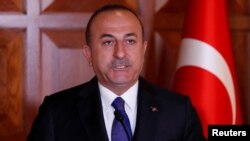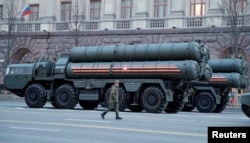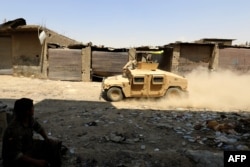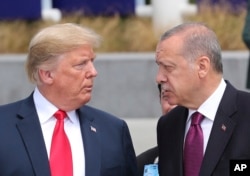Analysts say Turkey is running out of time to balance its relationship with Russia and the United States as Moscow and Washington step up pressure on Ankara over its pending acquisition of Russian missile defense systems.
The U.S. opposes the missile system transaction, maintaining that Turkey's use of the S-400s would compromise the technology of the F-35 fighter jet, which the U.S. and other NATO allies own. Turkey, also a NATO member, is due to take delivery of the F-35 this year. The U.S. has warned that if the Russian missiles are delivered, Turkey's purchase of the F-35 will be in jeopardy and sanctions will be possible.
Turkish Foreign Minister Mevlut Cavusoglu has dismissed Washington's concerns. "If these claims by the U.S. were true, S-400s would have already accessed [secrets] to the F-35 [aircraft] technology [as both are deployed] in Syria, the Baltic region and the north," he said Thursday during a visit to Latvia.
According to reports, Washington had requested that Ankara postpone the July delivery of the Russian missiles. However, in what was widely seen as a slap in the face to the United States, Turkish Defense Industries President Ismail Demir suggested the missiles could be delivered as early as next month.
"We are a serious country. Our deal with Russia continues," Demir said to reporters Thursday.
'No such thing as postponing'
Cavusoglu on Wednesday dismissed reports of any delay. "There is no such thing as postponing or canceling at this stage," he said. "It's not on the agenda, either."
Ankara's resistance to Washington coincides with Moscow's agreeing to Turkish requests for creation of a joint working group on the Syrian rebel enclave of Idlib. The working group is seen as giving breathing space to rebels, who have been under sustained Russian and Syrian government bombardment.
The latest assault was the most intense since Ankara and Moscow reached an agreement in September, preventing Syrian forces from overrunning the enclave.
"There are 2 million people in the [Idlib] enclave — jihadis and their families and those Sunni elements who will not make a deal with Damascus," said former senior Turkish diplomat Aydin Selcen.
"Turkey will be determined to avoid this enclave being overrun as those people have nowhere to go but to Turkey," said Selcen, who is a regional analyst.
"Turkey will not want this to happen as it would impose major security and humanitarian problems. While Ankara insists it will not allow this to happen, Moscow could be the key player," he added.
Peace efforts snagged
Russia and Turkey, along with Iran, are working together under the auspices of the so-called Astana Process to end Syria's civil war and secure a long-term peace. Those efforts have hit an impasse with disagreements on the formation of a committee to create a new constitution.
Turkish and U.S. diplomats are continuing their efforts to resolve a key point of tension. The diplomats aim to create a safe zone in Syria to protect Turkey's border from the Syrian Kurdish YPG militia, designated by Ankara as a terrorist organization.
Washington's support of the YPG in the war against the Islamic State group has soured relations with Turkey. The safe zone is seen as a way of putting ties between the two NATO allies back on track.
Expediting the delivery of S-400 missiles is interpreted to mean Moscow seeks to thwart U.S.-Turkish efforts to resolve differences on Syria. Ankara's procurement of the weapons would open the door to wide-ranging and severe U.S. sanctions under the Countering America's Adversaries Through Sanctions Act (CAATSA), which bans significant Russian military purchases.
"Our understanding is that Ankara has resigned to being sanctioned under CAATSA," said analyst Atilla Yesilada of GlobalSource Partners, a business management consultant in New York.
Turkish President Recep Tayyip Erdogan "still clings to the hope that a summit with [U.S. President Donald] Trump will allow him to keep the S-400s, with the latter applying only the least damaging articles of CAATSA," he said.
Fundamental differences
Ankara says Erdogan has built a unique working relationship with Trump, and that the problems in bilateral ties are the result of those working around the U.S. leader. However, some analysts suggest that the difficulties between the NATO allies are more fundamental.
"Turkish and U.S. understanding of the world order has been diverging rather than converging," said international relations professor Serhat Guvenc of Istanbul's Kadir Has University. "They view the international developments through a totally different lens. I think the problem is structural rather than conjectural."
Prying Turkey away from its Western partners is a decades-long strategic dream if not the goal of Moscow, but analysts contend that any Russian-Turkish alliance would inevitably fail on historical and regional rivalries, with Syria the likely flash point.
"Unfortunately, Ankara thinks they can play the Russians and Americans against each other. It won't work," said political scientist Cengiz Aktar of Athens University.
"The Russians sooner or later will clear Idlib, which is filled with tens of thousands of terrorists, and this is the first and foremost point of disagreement between Ankara and Moscow," he said.














